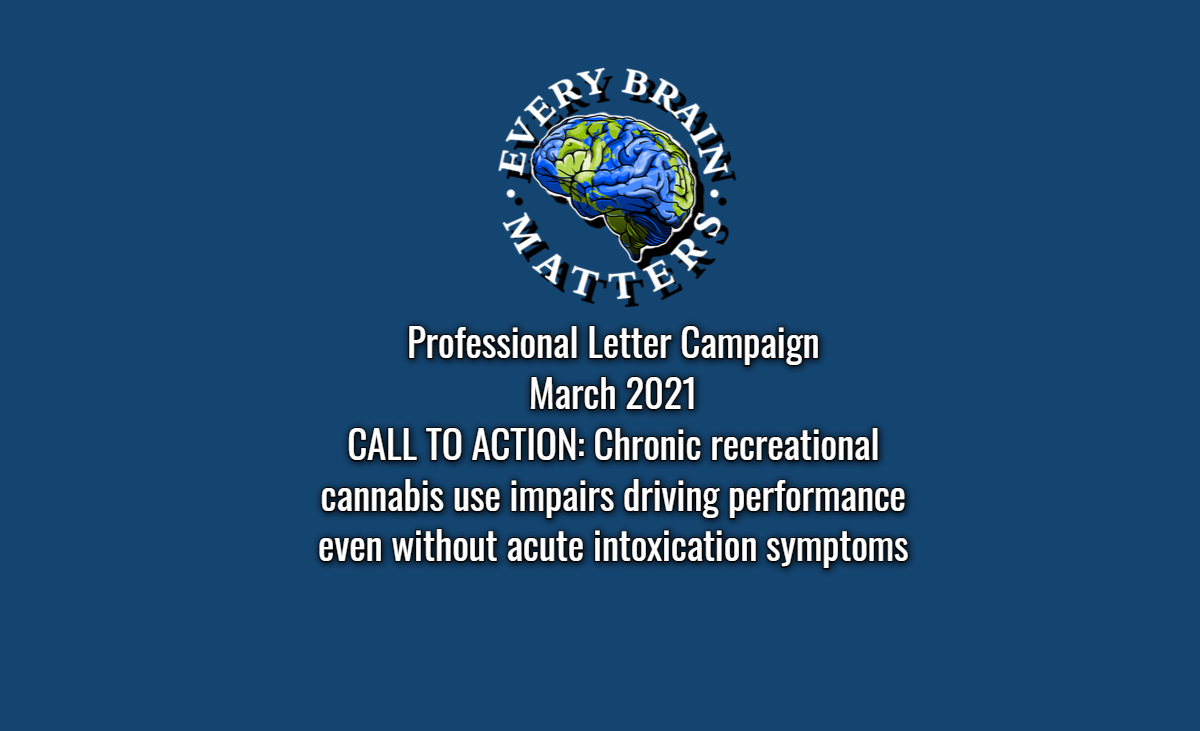Posted on July 22, 2021 View all news
Every Brain Matters Takes Action and we need your help!
Now on our site, you will find well-researched professional letters addressing the science behind the many harms of marijuana, to send to your legislators, doctors, business associates, city council, or anyone you think needs to read them. These are all peer-reviewed, free, and approved by a team of doctors and researchers.
These letters have been compiled for our EBM Advocacy team by medical and research professionals, and now are available for your use! They are part of an ongoing project to educate Congress led by EBM Advocacy members and cover a wide variety of topics:
March 2021
Dear :
I am writing to you today as I am very concerned for American families and communities regarding the widespread marketing and legalization of marijuana and the drug expansion culture.
I am contacting you with peer-reviewed science and data because we have been impacted negatively by the rampant marijuana proliferation in our communities. My goal is to provide policymakers with data and research to support your efforts in advancing legislation that promotes public health and safety for all Americans. I feel the attached articles could be helpful to you as you continue to pass informed legislation on marijuana and other drugs.
The marijuana lobby is aggressive in promoting an agenda that would increase access and availability of high potency, addictive products. Like Big Tobacco, they are not concerned with the science or societal impacts, only profits. You may have been told that marijuana is harmless and even safe. This could not be further from the truth. The science of marijuana harms is not debatable.
It is a popular belief that marijuana is medicine; however, anecdotal claims and unscientific reports are not sufficient evidence to further legalize/promote marijuana use. All FDA-approved pharmaceuticals have undergone scientific rigors, some of which began over a century ago.
There have been FDA-approved marijuana-related products since 1985 (dronabinol = THC, Marinol®, generic versions) and 2018 (cannabidiol = CBD, Epidiolex®). These products have undergone the scientific rigors of medical research unlike the marijuana and current “retail CBD” products — which are not regulated by the FDA — that are sold in many states to an uninformed public.
The goal of this email, and future emails, is to provide you with peer-reviewed scientific evidence about the many hazards of marijuana. To date, there exist over 36,200 articles on marijuana research on the National Institute of Health’s National Library of Medicine (.ncbi.nlm.nih.gov/?term=marijuana).
Attached please find in this month’s peer-reviewed scientific article: Dahlgren MK, et al. Recreational cannabis use impaired driving performance in absence of acute intoxication. Drug Alcohol Depend 2020 Mar 1;208:107771. doi: 10.1016/j.drugalcdep.2019.107771.
Here are three important facts from this article for your consideration.
- Chronic, recreational cannabis use is associated with impaired driving even in the absence of acute intoxication.
- Cannabis users performed worse than healthy controls with increased crashes, speeding, weaving and reduced road rule-following.
- Early onset of cannabis use was associated with greater driving impairment.
Thank you for reading my letter and the accompanying peer-reviewed scientific articles. If you can help us find any peer-reviewed, scientific articles that show that cannabis improves one’s driving ability – please send them to me. Simply reply to this email.
Thank you in advance for your attention to this very serious issue.


Thank you for all the work you’re doing.
Big Marijuana’s “glory days” are coming to an end.